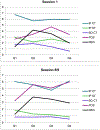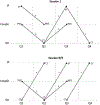Inside Alcohol Behavioral Couple Therapy (ABCT): In-session speech trajectories and drinking outcomes
- PMID: 32972642
- PMCID: PMC7553726
- DOI: 10.1016/j.jsat.2020.108122
Inside Alcohol Behavioral Couple Therapy (ABCT): In-session speech trajectories and drinking outcomes
Abstract
The alcohol treatment literature has established in-session client speech as a mechanism of change that therapist behavior can influence and that can predict drinking outcomes. This study aimed to explore temporal patterns of in-session speech in Alcohol Behavioral Couple Therapy (ABCT), including the unique interplay between client and partner speech and the role of speech trajectories in predicting client drinking outcomes. Participants were 165 heterosexual couples receiving ABCT in one of four clinical trials. We coded client speech on an utterance-by-utterance basis using the System for Coding Couples' Interactions in Therapy-Alcohol. We focused on individual-level speech codes of change talk and sustain talk and couple-level variables of positive and negative interactions. We segmented the initial and midtreatment sessions into quartiles to conduct path analyses and latent growth curve models. Path analyses suggested that clients and partners may not have been aligned in terms of treatment goals at the start of the therapy. This misalignment within couples was pronounced during the initial session and decreased by the midtreatment session, reflecting progression toward treatment goals. Of the latent growth curve models, only client sustain talk during the midtreatment session predicted greater client drinking at the end of treatment. Results provide insight into the inner workings of ABCT and suggest recommendations for ABCT therapists. This study also supports a growing consensus that sustain talk may be a stronger mechanism of change than change talk in various alcohol treatment interventions.
Keywords: Alcohol use disorder; Change talk; Couples; Mechanisms; Treatment.
Published by Elsevier Inc.
Conflict of interest statement
Declaration of competing interest Dr. McCrady is the author of a therapist manual and client workbook on Alcohol Behavioral Couple Therapy. She receives royalties from the sale of these publications. The authors have no other conflicts of interest to report.
Figures


Similar articles
-
Alcohol Behavioral Couple Therapy: In-session behavior, active ingredients and mechanisms of behavior change.J Subst Abuse Treat. 2019 Apr;99:139-148. doi: 10.1016/j.jsat.2019.01.018. Epub 2019 Jan 25. J Subst Abuse Treat. 2019. PMID: 30797386 Free PMC article. Clinical Trial.
-
Psychometric properties of the system for coding couples' interactions in therapy--alcohol.Psychol Addict Behav. 2014 Dec;28(4):1077-88. doi: 10.1037/a0038332. Psychol Addict Behav. 2014. PMID: 25528049 Free PMC article.
-
Sustain talk predicts poorer outcomes among mandated college student drinkers receiving a brief motivational intervention.Psychol Addict Behav. 2014 Sep;28(3):631-8. doi: 10.1037/a0037296. Psychol Addict Behav. 2014. PMID: 25222170 Free PMC article.
-
Alcohol-Focused Behavioral Couple Therapy.Fam Process. 2016 Sep;55(3):443-59. doi: 10.1111/famp.12231. Epub 2016 Jul 2. Fam Process. 2016. PMID: 27369809 Free PMC article. Review.
-
Behavioral couples treatment of alcohol and drug use disorders: current status and innovations.Clin Psychol Rev. 1998 Sep;18(6):689-711. doi: 10.1016/s0272-7358(98)00025-7. Clin Psychol Rev. 1998. PMID: 9779329 Review.
Cited by
-
Quality of Life Assessment Using the WHOQOL-BREF Survey in Hospitalized Patients with Alcohol Use Disorder from Romania.Diseases. 2024 Jul 16;12(7):158. doi: 10.3390/diseases12070158. Diseases. 2024. PMID: 39057129 Free PMC article.
-
The Role of the Family in Alcohol Use Disorder Recovery for Adults.Alcohol Res. 2021 May 6;41(1):06. doi: 10.35946/arcr.v41.1.06. eCollection 2021. Alcohol Res. 2021. PMID: 33981521 Free PMC article. Review.
References
-
- American Psychiatric Association. (1980). Diagnostic and statistical manual of mental disorders (3rd ed.). Washington, DC: American Psychiatric Association..
-
- American Psychiatric Association. (1994). Diagnostic and statistical manual of mental disorders (4th ed.). Washington, DC: American Psychiatric Association..
Publication types
MeSH terms
Grants and funding
LinkOut - more resources
Full Text Sources
Medical

